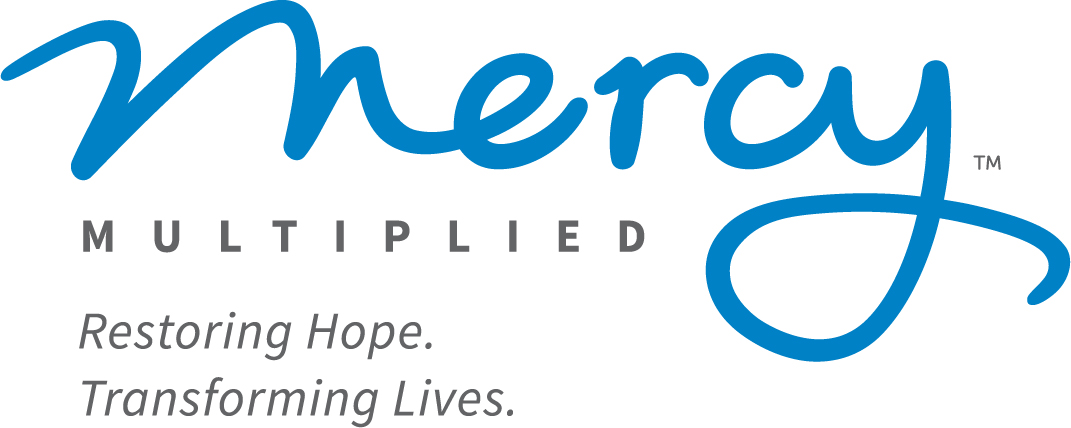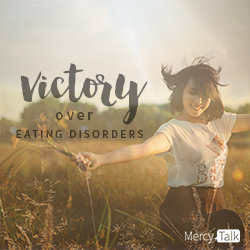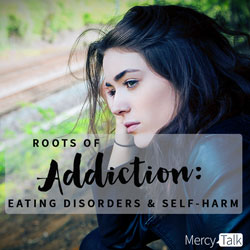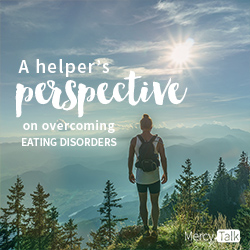Eating Disorders
The Numbers
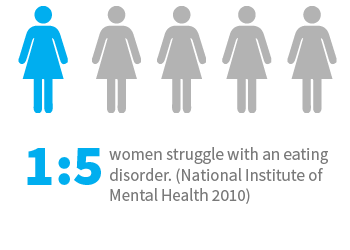


What is an Eating Disorder?
Eating disorders are serious and potentially life-threatening conditions that affect a person’s emotional and physical health. There are several types of eating disorders. Some people struggle with one predominately, while others bounce from one type to the next. Regardless of the specific eating disorder, severe and sometimes permanent damage can result from any of them. Eating disorders are very common today, but frequently go undetected due to their secretive nature. It’s important to be aware of eating disorder signs and symptoms so you can recognize that you have a problem – or that someone you know may be struggling. Many people with an eating disorder also struggle with additional mental health issues like depression, anxiety, or substance abuse. People with an eating disorder are at high risk for suicide and medical complications.
Eating Disorder Signs and Symptoms
Anorexia Nervosa:
A severely distorted perception of one’s physical appearance. This mindset leads to actions including: self-starvation and excessive exercise rooted in an intense fear of gaining weight. Possible signs and symptoms of anorexia include:
Physical: Continual weight loss, irregular periods, dizziness, fainting spells, low body temperature (complaining of being cold), pale complexion and dry skin, dry brittle hair or hair that is falling out, growth of facial and body hair, easy bruising, exhaustion and fatigue
Emotional: Intense fear of weight gain, excessive need for control, distorted body image, and dramatic mood swings
Behavioral: Wearing loose clothing, deception (hiding food in napkins or clothes), extremely restricted eating, abuse of laxatives, diet pills, or diuretics, obsession with caloric and fat content of food, compulsive exercise, making excuses not to eat, isolating or avoiding social events, consuming a lot of non-caloric foods (diet soda, gum, or coffee), avoiding restaurants and eating in front of others, ritualistic behaviors at meals (cutting food into small pieces, eating food in a particular order), discomfort with or avoiding being touched, defensiveness when questioned about weight, hyperactivity, and depression
Bulimia Nervosa:
Identified by compulsive overeating leading to self-induced vomiting as well as intentional vomiting after any/all food intake. Laxatives and diuretics are commonly used in an attempt to purge the body of food. Possible signs and symptoms of bulimia include:
Physical: Binging and purging, constant sore throat, broken blood vessels in eyes, dramatic weight fluctuation, digestive problems, swollen neck glands and puffy cheeks, scrape wounds on knuckles (due to contact between knuckles and teeth to induce vomiting), eroding of tooth enamel and increased cavities
Emotional: Self-criticism and poor body image, poor impulse control (drugs, alcohol, spending, moods), and promiscuity
Behavioral: Expressing guilt after eating, avoiding restaurants and eating in front of others, abusing laxatives, diet pills, ipecac, diuretics and/or enemas, frequently going into the bathroom right after meals, showering after meals, hiding food throughout the house, alternating between eating large amounts of food and self-starvation
Binge Eating Disorder:
Identified by consuming large quantities of food in an uncontrolled manner. Unlike Bulimia Nervosa, periods of binge eating are not followed by purging, excessive exercise, or fasting. This is the most common eating disorder in the U.S. Some of the signs and symptoms of binge-eating disorder look like this:
Physical: Rapid weight gain.
Emotional: Poor body image, depression, excessive guilt, feeling distressed, ashamed, or guilty about your eating
Behavioral: Eating large amounts of food, eating late at night, sexual avoidance, hiding food throughout the house, eating to the point of physical discomfort, avoiding social events, eating without an appetite, isolating, and sleeping often during the day.
Need Help?
If you or someone you know is struggling with an eating disorder, Mercy Multiplied can help. Our residential program helps young women ages 13-32. If you reside in Monroe, LA or St Louis, MO, please consider applying to our Center for Wellness and Counseling. These outpatient counseling services are offered to men and women 13 and older. Our residential and outpatient services are free-of-charge, and you can learn more about these services here. If you do not qualify for either of these programs, please consider finding a Christian counselor in your area or visit aacc.net.
